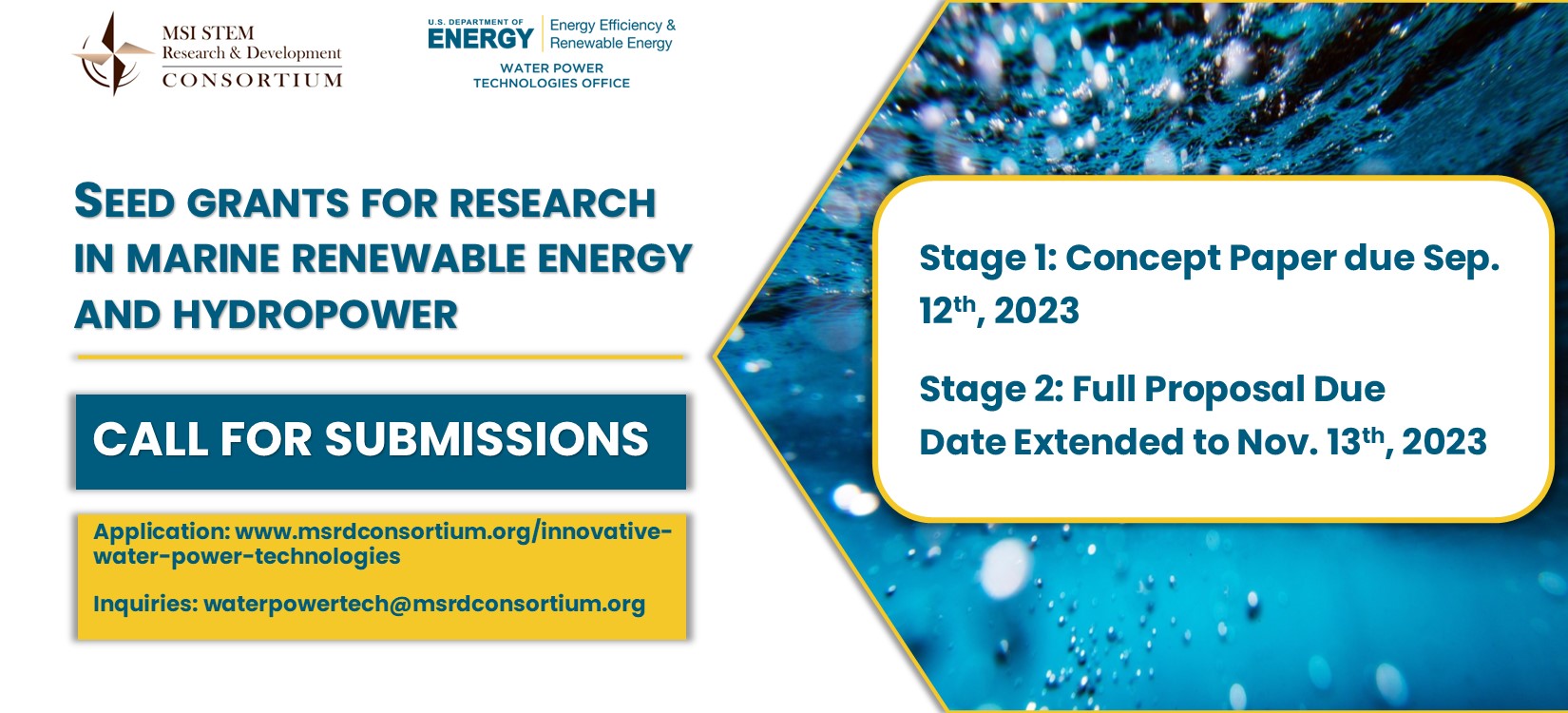Innovative Water Power Technologies
Innovative Water Power Technologies

1. Background:
The Water Power Technologies Office (WPTO) supports research, development, demonstration, and the commercial application (RDD&CA) of marine renewable energy and hydropower technologies that expand and diversify the nation’s clean energy portfolio. Water power is an integral part of the solution to achieve 100% electricity generation from zero-carbon sources by 2035; while also generating economic opportunity and growth through the deployment of new energy technologies. (Read more on WPTO's page)
WPTO’s marine energy program supports technologies that harness power from ocean waves, tides, river and ocean currents, ocean thermal gradients, and salinity and pressure gradients. The hydropower program supports innovations to modernize the United States’ oldest renewable energy resource via low-impact technologies, grid reliability and resilience, hydropower fleet modernization and maintenance, environmental and hydrologic system science, and data and analytics.
Through this opportunity, WPTO aims to identify promising, potentially high-impact research ideas from minority-serving colleges and universities, especially new entrants or those who have not recently worked with the WPTO. Eligible researchers could have a wide range of expertise, including water power-related engineering and other technology-specific expertise , but also expertise in social science, biological and environmental sciences, local governance processes, energy system integration, community-scale power systems, and other related areas. Researchers whose work has robust and deep ties to their communities and will be able to leverage those ties in their projects are particularly encouraged to apply.
2. Research areas
2.1 Marine Energy - Marine energy technologies are at an early stage of development due to the fundamental technical challenges inherent in generating power from flowing water, which is a dynamic, low-velocity, and high-density resource, while also withstanding corrosive marine environments. These challenges are intensified by lengthy permitting processes and high costs associated with in-water testing. Addressing these challenges is a key part of WPTO’s portfolio. WPTO is also expanding opportunities to realize the unique value proposition for smaller-scale marine energy systems within the blue economy as part of the Powering the Blue Economy Initiative. This includes opportunities to: (1) power microgrids in remote coastal communities, including those currently dependent on fossil fuels; (2) power ocean-based scientific and commercial missions currently limited by incumbent energy sources; and (3) integrate with ocean and coastal-based applications like desalination and aquaculture where marine energy can uniquely improve the resilience and economic sustainability of local communities. WPTO seeks new and innovative ideas that address the marine energy program’s goals, including opportunities to engage blue economy markets and end-users. This may include addressing technology challenges, engaging end users in the industry as well as the communities these technologies may be deployed in, and discovering and developing new use cases for marine energy integration. WPTO is interested in research frameworks to help understand and mitigate socioeconomic risks of marine energy development. These assessments of qualitative and quantitative social and economic data are needed to understand potential risks and benefits of marine energy development for communities and local economies.
2.2 Hydropower: WPTO seeks to better understand opportunities to innovate hydropower in ways that make it more environmentally sustainable, increase energy storage capacity, serve the penetration of other renewables into the grid, and modernize the industry. Emerging areas of interest to WPTO include but are not limited to the management of water resources in reservoirs, climate-resilient or adapted hydropower, pumped-storage hydropower, and the utilization of non-powered dams. For this opportunity, WPTO is interested also in advances in hydrologic and/or hydropower systems modeling for climate resilience. Changing climate and weather patterns can create significant challenges for water and power management. While widely available forecasting and prediction products help address management challenges, there remain significant opportunities for model improvements, new model development, and uncertainty analysis. WPTO seeks advancements in models and analytics that attempt to understand the impact of changing water availability and quality on hydropower and reservoir systems. Examples of this type of work include applications of artificial intelligence, machine learning, signal processing, decision making under deep uncertainty, or other approaches that improve data analysis.
2.3 Open Topics – In recognition that many innovative, potentially high-risk, approaches to WPTO priorities may not be captured by the above technical objectives, WPTO seeks research and development that more broadly supports objectives outlined in the Multiyear Program Plan (https://www.energy.gov/eere/water/multi-year-program-plan)
3. Period of Performance: Fall 2023 – January 2025
4. Application Process
Stage 1 Concept papers are submitted to screen for full proposal invitations. Concept paper template can be found (MSRDC linked page to template)
Stage 2 Requests for full proposals will be sent from MSRDC.
The application deadlines are,
Stage 1: September 12th, 2023
Stage 2: November 13th , 2023 at 11:59 PM (ET)
The application is now in Stage 2 submissions.
Apply by selecting a topic area, below:
Recording of an Informational Webinar held on September 5th, 2023 - Watch Here
